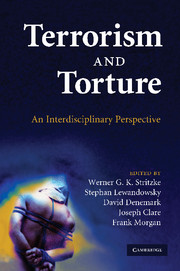Book contents
- Frontmatter
- Contents
- List of figures
- List of tables
- List of contributors
- Preface
- 1 The terrorism–torture link: when evil begets evil
- 2 Torture, terrorism, and the moral prohibition on killing non-combatants
- 3 The equivalent logic of torture and terrorism: the legal regulation of moral monstrosity
- 4 War versus criminal justice in response to terrorism: the losing logic of torture
- 5 Reducing the opportunities for terrorism: applying the principles of situational crime prevention
- 6 From the terrorists' point of view: toward a better understanding of the staircase to terrorism
- 7 If they're not crazy, then what? The implications of social psychological approaches to terrorism for conflict management
- 8 The cycle of righteous destruction: a Terror Management Theory perspective on terrorist and counter-terrorist violence
- 9 Misinformation and the “War on Terror”: when memory turns fiction into fact
- 10 Icons of fear: terrorism, torture, and the media
- 11 What explains torture coverage during war-time? A search for realistic answers
- 12 Reversed negatives: how the news media respond to “our” atrocities
- 13 Terrorism and TV news coverage of the 2001 Australian election
- 14 Terrorism, anxiety, and war
- 15 I'm right, you're dead: speculations about the roots of fanaticism
- 16 Reducing terrorist risk: integrating jurisdictional and opportunity approaches
- Index
- References
11 - What explains torture coverage during war-time? A search for realistic answers
Published online by Cambridge University Press: 15 September 2009
- Frontmatter
- Contents
- List of figures
- List of tables
- List of contributors
- Preface
- 1 The terrorism–torture link: when evil begets evil
- 2 Torture, terrorism, and the moral prohibition on killing non-combatants
- 3 The equivalent logic of torture and terrorism: the legal regulation of moral monstrosity
- 4 War versus criminal justice in response to terrorism: the losing logic of torture
- 5 Reducing the opportunities for terrorism: applying the principles of situational crime prevention
- 6 From the terrorists' point of view: toward a better understanding of the staircase to terrorism
- 7 If they're not crazy, then what? The implications of social psychological approaches to terrorism for conflict management
- 8 The cycle of righteous destruction: a Terror Management Theory perspective on terrorist and counter-terrorist violence
- 9 Misinformation and the “War on Terror”: when memory turns fiction into fact
- 10 Icons of fear: terrorism, torture, and the media
- 11 What explains torture coverage during war-time? A search for realistic answers
- 12 Reversed negatives: how the news media respond to “our” atrocities
- 13 Terrorism and TV news coverage of the 2001 Australian election
- 14 Terrorism, anxiety, and war
- 15 I'm right, you're dead: speculations about the roots of fanaticism
- 16 Reducing terrorist risk: integrating jurisdictional and opportunity approaches
- Index
- References
Summary
The international community no longer condones torture. Pressure by various groups of people throughout the world has led to multiple legal prohibitions of the practice. For example, torture is forbidden by the 1948 Universal Declaration of Human Rights, the 1949 Geneva Conventions, the 1984 United Nations Convention against Torture (United Nations, 1984), and by multiple regional treaties (Nagan and Atkins, 2001). Many of these treaties have monitoring mechanisms. For example, the UN has a Committee against Torture, consisting of ten experts charged with monitoring states' compliance with anti-torture conventions. Likewise, the UN Commission on Human Rights has had a Special Rapporteur on Torture office since 1985. Individual countries also have their private and public monitoring bodies. For instance, Israel has a Public Committee against Torture that investigates torture allegations, and Amnesty International, a non-governmental privately funded organization, uses its worldwide membership to fight against human rights abuses wherever they may occur.
The persistence of torture
Despite these institutional constraints, torture continues essentially unabated, judging from Amnesty International's Annual Reports. That makes the use of torture a true paradox because it is simultaneously widely practiced and yet is a universal taboo. Torture is particularly common during war-time when governments attempt to extract strategically salient information from captured enemies. Torture is easier to justify when countries can claim that it is done for a noble cause – the protection of the country's citizens during war (see also Bellamy, this volume).
Information
- Type
- Chapter
- Information
- Terrorism and TortureAn Interdisciplinary Perspective, pp. 221 - 245Publisher: Cambridge University PressPrint publication year: 2009
References
Accessibility standard: Unknown
- 3
- Cited by
